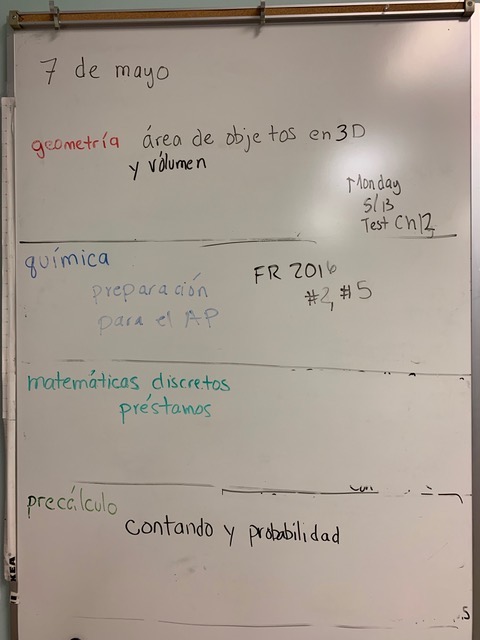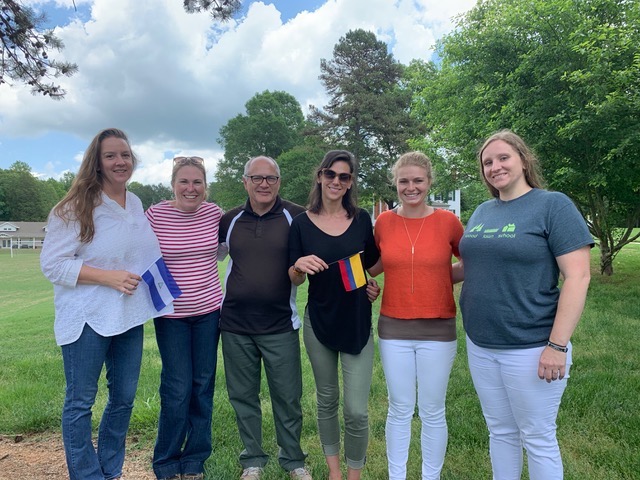While all Woodlawn students attend an hour long Spanish class each day, it should not surprise you to learn that they are actually exposed to Spanish throughout the other six periods of their day, and perhaps even into their extra-curriculars!

At Woodlawn, our students are surrounded by an impressive number of bilingual Upper School faculty, and even when not in class, it's likely you'll hear Spanish being spoken in the halls and outside as students eat, play, learn, and mingle. And, when you walk into Dr. Stutzman's AP Calc class, don't be surprised if you see his math lessons written in Spanish on his white board. Spanish teachers aren't the only ones speaking and writing Spanish!
Laine Amortegui, Head of Upper School, was motivated to first learn Spanish in school so that she could better understand the conversations of her best friend and family, who were Panamanian. She believes that becoming bilingual is a lifelong journey. Mastering the Spanish language came as a result of extensive college study as well as the opportunity to routinely practice her learnings once she met her Colombian husband. She chose to raise her children bilingually, which challenged her to m maintain and increase her fluency every day. Amortegui has visited 17 of the 21 Spanish-speaking countries, spending the most time in Colombia and Costa Rica. When asked what advice she would give to Woodlawn students about the benefits of mastering a second language, she shared, "Being immerse in another culture and also being able to converse with its people is a priceless experience in connecting with others. I encourage all students to make the time to become functional in a foreign language. If all students take their Woodlawn classroom experience, get out of the comfort zone, and make the effort to speak with other Spanish-speakers, it is life changing! I believe bilingualism will become the next skill set that is a given — for example, when typing was an impressive skill to have, but it's expected."
In Hahna Hayden's (Profe) Upper School Spanish class, a goal to speak Spanish 75% of the time has been set for her students. Profe began learning Spanish in her 7th grade year and continued throughout college. During her junior year of high school, she traveled to Quito, Ecuador as a foreign exchange students. She has since lived in Ecuador and visited Spain, Argentina, and Chile. Her favorite part of the experience is being able to see similarities and differences between each country. Insights to the variations within each country, seeing how the coastal and mountainous cities differ from each other sharpen her cultural perspective. Prior to teaching Spanish, Profe worked in the law enforcement field where she was able to use her interpretation skills for the accused, witnesses, and victims. "If you love people, learn languages," she encourages. "You open up entirely new sets of people with whom you can converse!"
Señor Castillo was born in Caracas, Venezuela where he spoke Spanish, his first language, at home. Castillo believes that we will always learn new things even in our own language. “Mastering a second or third language is a unique experience that gives you new opportunities,” he said. “Take advantage of having so many skilled Spanish teachers. Learn the Spanish language - you won’t regret it! It’s an investment but you will see the benefits of it in the future.”
Even after a challenging Spanish class is complete, students will continue with their day with English class. They may claim that they are “mentally too worn out to participate,” but they should not take speaking their first language for granted in case Dr. Erin Gale transitions to speaking Spanish instead. Dr. Gale learned to speak fluently when she attended a Spanish immersion program for one month in the summer between her junior and senior years of high school in Virginia. Attendees pledged to speak Spanish the entire month and breaking the rules was cause for dismissal from the program. After all of the classes, activities, electives, and field trips, she was dreaming in Spanish. While in college, Dr. Gale lived and studied in Valencia, Spain for six months. She lived in a home with a native Spanish speaker, forming a close bond with her as well as friendships with other students that have endured for more than twenty years. Traveling to nine European countries including Spain and Portugal, she gained confidence as a traveler and introduced her family to her new lifestyle. During her time in Spain, she took literature and language courses in Spanish. These efforts helped her land her first job teaching English as a second language to migrant farm workers in rural Virginia. Dr. Gale then transitioned to teaching Spanish at the high school level, as well as English. She also directed a literacy program for Spanish-speaking parents and their children. To earn her doctorate degree in English, she was required to be proficient in two other languages, which she checked off as Spanish and French. Dr. Gale reflects about learning Spanish, “It's been critical to my career path, but more importantly to my ability to connect with people from all walks of life and to use my education to benefit others who did not grow up in a literacy-heavy environment.”
Students love running into the history room while the previous class is still packing up. Occasionally, they might turn their heads as they are redirected in a foreign language by Mrs. Obando. Obando, born in Miami, spoke just enough Spanish to get by as a child. Before learning Spanish, she was fluent in French. After deciding to move to Nicaragua, she knew that she needed to master Spanish. She revealed that the journey was not easy. After getting over the embarrassment of making mistakes and not being able to participate enough in family events, she knew that she had to be patient with herself and even carried around a dictionary, since this was before the age of the iPhones. As she reflects on her experience, she recognized that taking classes would have been easier, but then it would have been too easy. In summary, it took about three years to participate in group conversations and finally understand the jokes, all while navigating Nicaragua with her newborns. Mrs. Obando encourages the upper schoolers to take advantage of learning in a classroom while being at the same level as your peers. “Languages open up the world. You will have different job opportunities, different travel experiences, meet different people. There is no single skill that is more valuable than language.”

From left to right: Mrs. Obando, Dr. Gale, Dr. Stutzman, Señora Laine, Señorita Sayre, Profe.




